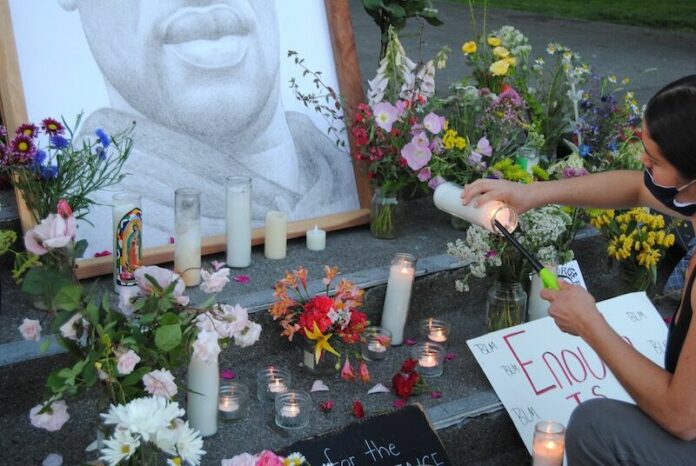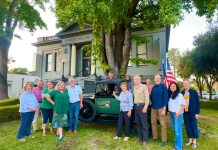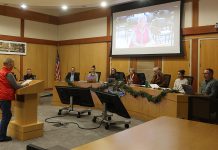
Local high school activists welcomed attendees to a candlelight vigil for George Floyd in the Sebastopol Plaza on May 25, marking the first anniversary of his murder under the knee of former Minneapolis police officer Derek Chauvin.
Chauvin has since been convicted and sentenced to prison. The people of Sebastopol and cities across the world took to the streets and to local government over the summer and since then to protest his death, police brutality and systemic racism oppressing Black communities overall.
About 90 people, including Mayor Una Glass, came out to the Wednesday night vigil where they were invited to write how they’ve been changed by the past year, draw pictures and messages in chalk and share their thoughts in an open mic.
Vases of flowers, tall veladoras and other candles surrounded a framed portrait of George Floyd on the steps of the gazebo at the vigil organized by local high schoolers Lume Dorado, Dezi Rae Kai, Adanna Okiwelu and others from the Black Lives Matter Visibility Team.
“We’re here just kind of trying to spark the conversations again. I think they’ve died out, honestly. And the movement doesn’t end when the hashtag ends and I think that’s important to remember,” Dorado said.
Children, teenagers and adults alike sat kneeled and cross-legged drawing and writing with chalk across the plaza where hundreds placed their handprints in multi-colored paint last summer, finalizing the mural stretching “BLACK LIVES MATTER” from one end to the other.
Toward the end of the vigil, organizers offered the participants small candles before Dorado led attendees in kneeling for nine minutes and twenty-nine seconds, the amount of time prosecutors said Chauvin knelt on Floyd’s neck.
Josh Bradt said he appreciated the music and youth leadership, as well as the uplifting spirit of the event and how intergenerational it was.
“I feel good about being here. It’s about as diverse of a crowd you will see in Sebastopol, which is nice,” he said. His family moved to Sebastopol six years ago, from Richmond, Bradt said.
“I’ll say, with moving up to Sebastopol, which is a very white town, and raising my family here, and the schools are very white, I’ve felt less safe in some ways over the past couple years just being out and about. But during COVID, since I was inside, maybe that feeling kind of went away,” Bradt said.
Looking back on the past 12 months, Bradt said he’s noticed in himself and society a new capacity for talking about race that has helped him find his own voice in certain spaces where he didn’t always think he’d use it “or that it was something folks sought.”
During the open mic, one attendee introduced herself as a lifelong activist and said police brutality and killings aren’t a matter of bad apples. She said police were developed to protect property and money, tracking down enslaved people who escaped bondage and stopping the labor movement.
“You know, one of the old tropes in our culture is that it can’t happen here. Well, it did happen here with Jeremiah Chass and we need to remember him,” she said. In 2007, sheriff’s deputies shot and killed 16-year-old Jeremiah Chass of Sebastopol during a mental health crisis, Sonoma West Times & News reported in March of 2007.
The vigil was attended by Kyle Seever, a Windsor resident whose brother was killed by former Modesto Police Officer Joe Lamantia in late December of 2020. Twenty-nine-year-old Trevor Seever, unarmed, was the fourth to die in a shooting involving Lamantia, according to CBS Sacramento in January.
“The man that killed George Floyd shouldn’t have been there the day he killed George Floyd. He had murdered previous people and if he had been held accountable for his actions at that time, George Floyd would still be here today,” Seever said during the open mic. “Same thing with my brother.”
Seever said he has probably met more than 50 families impacted by police brutality since losing his brother five months ago and goes to a different city nearly every weekend to speak and spread awareness on police brutality, corruption and false narratives from police that he said he’s learned first-hand slander families and their loved ones.
Having grown up in Modesto, Seever said he hadn’t heard of what happened to Chass until that night, “but it can happen anywhere.”
Deborah Unger, a Sebastopol resident, said that she wants to do more to support the momentum for change. “I am looking forward to the next few weeks where I won’t be working as much so I can take some time to sit down and figure that out, where I’m being called and what is happening.”
Aside from contacting senators in the past months, Unger said she’s been more intentional about supporting Black businesses, but knows there’s more she can do. Getting one’s family and friends to get more involved with her has been one way she sees this happening, she said.
“Everybody knows somebody and if you just say, ‘Hey, why don’t we check this out,’ or ‘Let’s do something different’ or ‘Let’s actually talk about these things,’” she said. “I’ve had pretty frank conversations with a lot of friends this past year about, for lack of a better phrase, state of the world. Where do we want things to be going in the future, and a better future for everybody, not just … whoever thinks that they’re the top.”
Okiwelu said there are large-scale, systematic changes that can be made, “but what we can do here and what we have been doing is creating this interconnectedness between ourselves and the people in our community and the people around us.”
Meeting people, understanding their stories and uniting in a vision of equality on a local level also makes a big difference, Okiwelu shared.
Kai said she always knew people were capable of joining as a community but seeing it for herself through her own organizing has been something else, “and you just have to take that first step into organizing or doing whatever and getting there.”
“Every time I walk through this square, I’m just really proud of everybody who’s shown up and proud of some of the progress we’ve made and the change we’re making slowly,” Kai said. “So, walking through here definitely makes me emotional. Just also recognizing how traumatizing it’s been for my entire life but especially the last year.”








